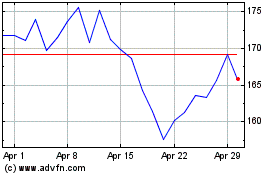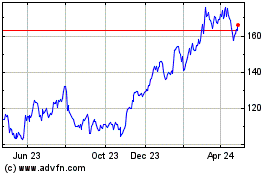By Asa Fitch
Qualcomm Inc. on Tuesday said Chief Executive Steve Mollenkopf
would step down in June after leading the mobile-phone chip giant
through an unusually tumultuous period that has seen the company
capitalize on booming smartphone sales as it battled one of its
most important customers, Apple Inc.
The company named Cristiano Amon as Mr. Mollenkopf's successor,
handing over the reins as Qualcomm aims to exploit rising demand
for superfast 5G phones and leave behind a period of legal
struggles. Mr. Mollenkopf is to remain an adviser for a period
after Mr. Amon succeeds him, the company said.
As Qualcomm's president, Mr. Amon, 50 years old, has been the
public face of the company's efforts to become a central supplier
in the shift to 5G, winning business with Apple, building on its
share of the Chinese handset market and moving into new areas such
as chips for autonomous cars. He is set to take over on June 30,
the company said.
Mr. Mollenkopf, 52, was promoted from president to CEO in 2014
and led the company through several years of unprecedented
challenges. They included a long-running legal struggle with Apple
over Qualcomm's patent-licensing practices, an antitrust case
brought by the Federal Trade Commission, repelling an activist
investor, averting a hostile takeover and having a $44 billion
acquisition scrapped amid U.S.-China political tensions.
Mr. Mollenkopf was in the running to succeed Steve Ballmer as
Microsoft Corp.'s CEO in 2013 when Qualcomm gave him the top job --
a surprise move at the time. Microsoft eventually chose Satya
Nadella, who has steered the company to record sales and made it
one of the most valuable companies in the world.
Mark McLaughlin, Qualcomm's chairman, said Mr. Mollenkopf faced
"more in his seven years as CEO than most leaders face in their
entire careers," citing his guiding of the company through its
challenges.
Mr. Amon has spent most of his career at Qualcomm, spread over
two stints interrupted by a period during which he helped rescue a
venture-capital-owned telecom company in his native Brazil. After
rejoining Qualcomm in 2004, he rose up the ranks within the
company's chip-making operation, and became president -- and, to
many observers, the presumptive heir to the CEO -- in 2018.
In an industry rife with dry-talking engineers, Mr. Amon is
known for being gregarious and high-energy -- traits on display
when he unveiled Qualcomm's latest cellphone chip last month.
Qualcomm normally holds the annual product showcase in Hawaii, but
had to move it online during the pandemic.
"I'm sorry we couldn't bring you to Hawaii, so we're bringing a
bit of Hawaii to you," Mr. Amon said, standing on a virtual beach,
palm trees and the ocean in the background.
The CEO switch comes against the backdrop of a rapid deployment
of new 5G networks world-wide that has boosted Qualcomm's fortunes.
The company is a leading supplier of communications chips for
mobile phones, including Apple's latest offerings -- though the
iPhone maker has signaled it was starting to do some of that work
in-house.
Mr. Amon, in a statement announcing his appointment, signaled
Qualcomm's focus in coming years. "In addition to driving the
expansion of 5G into mainstream devices and beyond mobile, Qualcomm
is set to play a key role in the digital transformation of numerous
industries as our technologies become essential to connecting
everything to the cloud," he said.
Qualcomm in November said sales in its most recent quarter
jumped sharply to $8.3 billion, beating Wall Street forecasts and
boosting a stock that climbed 73% last year.
While the global pandemic initially dented demand for
smartphones, handset sales have rebounded in recent months, leading
Qualcomm to issue an optimistic forecast for 5G phone shipments
this year, putting them at 450 million to 550 million.
The U.S. chip industry is undergoing sweeping changes amid
pandemic-fueled strong demand for laptops, videogames and data
centers that has sent shares in some companies surging. Nvidia
Corp., whose shares more than doubled last year, has overtaken
Intel Corp. as America's most valued chip company.
A wave of consolidation has swept through the chip industry over
the past year, driven in large part by stock prices that have risen
during the pandemic. Chip-company stocks have become hot
commodities as they benefited from a surge in digital transactions
and demand for computing power in the new work-from-home
economy.
Nvidia agreed to pay $40 billion for Arm Holdings, the British
mobile-phone chip design giant backed by SoftBank Group Corp., in a
stock and cash deal that would be the industry's biggest ever if it
goes through. Advanced Micro Devices Inc. has said it plans to buy
rival chip maker Xilinx Inc. in an all-stock deal valued at $35
billion. Those proposed tie-ups landed after Analog Devices Inc. in
July agreed to pay more than $20 billion for Maxim Integrated
Products Inc.
Though Qualcomm's stock also has risen sharply, it so far hasn't
joined the latest deal-making frenzy. Four years ago its bid for
rival chip maker NXP Semiconductors NV for $44 billion fizzled when
Chinese authorities didn't give their approval to the transaction.
Qualcomm became a takeover target in 2017 when rival Broadcom Inc.
launched a hostile takeover bid that the Trump administration
blocked.
Qualcomm's business model, which mixes chip sales with
patent-licensing deals, has made it another kind of target in
recent years. The FTC and Apple sued the company in 2017, alleging
it leveraged its status as a key supplier of mobile-phone chips to
extract unfair fees for its licensing division. Qualcomm settled
its differences with Apple in 2019, and last year won the FTC case
in a federal appeals court.
Mr. Amon has long been associated with the chip division, which
has become increasingly central to Qualcomm's business future with
the 5G rollout. Qualcomm chips powered 39% of 5G phones sold
world-wide in last year's third quarter, according to Counterpoint
Technology Market Research.
Mr. Amon's appointment came perhaps earlier than anticipated,
though the change itself wasn't a surprise, said Stacy Rasgon, an
analyst at Bernstein Research. Qualcomm, he said, isn't expected to
alter its course under Mr. Amon. "I think we move ahead as
planned," Mr. Rasgon said.
Write to Asa Fitch at asa.fitch@wsj.com
(END) Dow Jones Newswires
January 05, 2021 11:09 ET (16:09 GMT)
Copyright (c) 2021 Dow Jones & Company, Inc.
QUALCOMM (NASDAQ:QCOM)
Historical Stock Chart
From Mar 2024 to Apr 2024

QUALCOMM (NASDAQ:QCOM)
Historical Stock Chart
From Apr 2023 to Apr 2024
